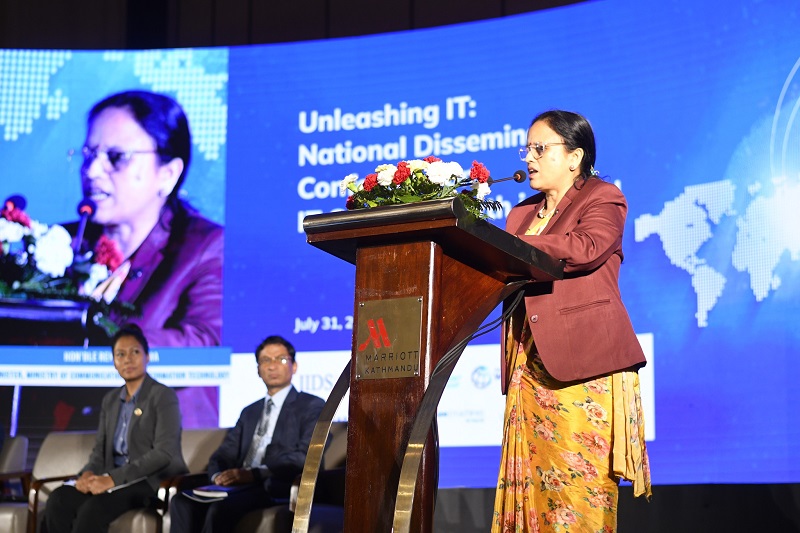Nepal’s IT Services Export: A Driving Force for Economic Growth
8th August 2023, Kathmandu
Nepal is harnessing its prowess in information technology (IT) services to fuel substantial economic development. A study conducted by the Institute for Integrated Development Studies (IIDS) has unveiled that the country’s IT sector contributes a noteworthy annual income of 67.46 billion rupees ($515 million) through services such as programming, coding, designing, software development, and testing.
This exponential growth not only bolsters Nepal’s gross domestic product (GDP) but also amplifies its foreign exchange reserves and overall economic advancement.
Economic Impact in Focus
The study underscores the transformative effect of Nepal’s IT sector on its economic landscape, with notable findings including:
Annual Earnings:
The IT sector yields an annual income of 67.46 billion rupees through service exports.
GDP Significance:
Information technology service exports constitute 1.4 percent of Nepal’s GDP.
Foreign Exchange Boost:
These exports contribute 5.5 percent to the nation’s foreign exchange reserves.
Fortifying Nepal’s Economic Pillars
Nepal’s IT services sector is swiftly becoming a pivotal contributor alongside pillars such as tourism, hydropower, and remittances. The report underscores the potential of IT service exports to diversify Nepal’s economic foundation and elevate its stature in the global marketplace.
According to the IIDS report, “IT service export from Nepal is valued at about 515 million dollars.” This figure signifies an impressive 64.2 percent increase in 2022 compared to the previous year, showcasing the sector’s rapid growth trajectory.
Unleashing Export Potential
The study spotlights programming, coding, designing, software development, and testing as the primary IT services exported from Nepal. With 16 out of 7,637 IT companies venturing into exports in 2022 and a workforce of 66,509 individuals, including 14,728 freelancers, the sector’s ability to deliver high-quality services on the global stage is evident.
Challenges and Future Horizons
While the sector’s potential is undeniable, challenges persist. Nepali IT entrepreneurs cite limited opportunities within Nepal, especially in securing significant IT projects. However, the study advocates for skill enhancement, robust infrastructure investment, and favorable policy adoption to amplify outsourcing and freelancing efforts.
Government Response and Progressive Measures
Nepal’s Minister of Communication and Information Technology, Rekha Sharma, emphasizes the government’s commitment to the IT sector. Minister Sharma outlines initiatives including:
Nurturing Startups:
Cultivating innovation and entrepreneurship through an incubation center.
Streamlining Processes:
Facilitating free registration of new companies, online registration, and capital increase.
Labor Flexibility:
Implementing flexible labor policies tailored for IT and innovation-based industries.
Nepal’s IT service exports are propelling the nation toward accelerated economic growth, positioning it as a notable contender in the global digital arena.
The sector’s rapid expansion, coupled with strategic governmental initiatives, holds the potential to reshape Nepal’s economy, amplify job opportunities, and drive innovation. By prioritizing quality education, skill enhancement, and policy reforms, Nepal’s information technology sector is on track for continued remarkable growth and transformation.
About IIDS
The Institute for Integrated Development Studies (IIDS) is an independent, non-partisan, and not-for-profit think-tank based in Kathmandu, Nepal. Established in 1979, IIDS is dedicated to research and policy advocacy rooted in evidence and a holistic approach to sustainable development. With a vision for the future, IIDS seeks to consolidate policy priorities across Nepal and South Asia, promoting impactful research, advocacy, and innovation incubation to drive development.
Guided by a Governing Council comprising former ministers, policymakers, administrators, and scholars, IIDS houses over 25 research, program, and administrative staff, led by an Executive Director. With distinguished fellows, senior fellows, and adjunct fellows, IIDS maintains a robust team of experts.
The organization collaborates with the Government of Nepal, international organizations, and a network of consultants to facilitate development-focused research and projects across various sectors.
Through a rich legacy of research spanning over four decades, IIDS has been instrumental in shaping evidence-based policymaking and making a meaningful impact on Nepal’s development landscape.






